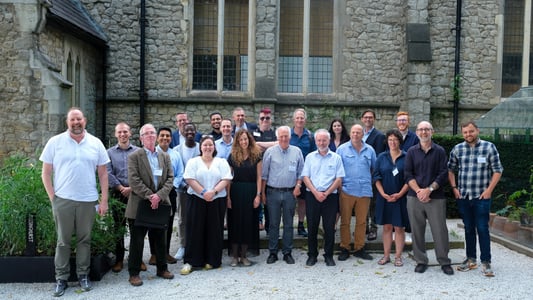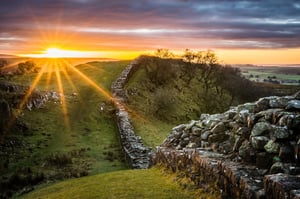John Carmichael – UKNC Communications and Marketing Manager – 15 August 2024

- A major new pilot is looking to understand the growing and multiple impacts of climate change on cultural and natural heritage across the UK. Three UK UNESCO sites are set to receive funding and expert support to engage in the pilot over a 12-month period.
- Teams at North Devon Biosphere Reserve, Fforest Fawr Global Geopark Hadrian’s Wall World Heritage Site, will test how new ways of collaborative working and improved sharing of data can help to better understand and address the impacts of climate change on the UK’s cultural and natural heritage.
- The £1.8 million pilot is being funded by HM Treasury and led by the UK National Commission for UNESCO and the Department for Culture, Media and Sport.
A groundbreaking new project
The UK National Commission for UNESCO and the Department for Culture, Media and Sport has announced today (15 August 2024) that three UNESCO sites in the UK are set to receive funding and support to take part in the groundbreaking pilot project, Climate Change & UNESCO Heritage.
From extreme weather fluctuations, to the devastating effects of pests and non-native species, climate change is creating and accelerating the interconnected challenges affecting the UK’s cultural and natural heritage. Much of the data and expertise needed to help tackle these issues already exists, yet siloed working practices at every level can often hinder public and private sector organisations from sharing data effectively, or from working collaboratively on common challenges.
Funded by the HM Treasury Shared Outcomes Fund, the £1.8 million Climate Change & UNESCO Heritage project aims to explore, develop and test ways to overcome these barriers. With cultural and natural heritage being foundational to localising global challenges like climate change, the pilot will also capitalise on the huge potential UNESCO designated sites offer as testing grounds for developing new ways of working.
The project builds on research by the UK and Canadian National Commissions for UNESCO which found that UNESCO sites are not only ideal test beds for developing participatory approaches to global challenges, but are also well-placed to support genuine, on-the-ground collaborative action that can help to achieve outcomes aligned with the 2030 United Nations Sustainable Development Agenda.
Exploring challenges at a local and national level
Work is already underway to bring together government departments and public agencies to explore these challenges at a national level. North Devon Biosphere Reserve, Fforest Fawr Global Geopark, and Hadrian’s Wall World Heritage Site, have been selected as the three UNESCO sites that will join the project as local case study locations for a 12-month period ending July 2025.
Each site will work with local communities and stakeholders to co-design, develop and test locally-derived models of partnership working. They will also create new shareable and reusable data tools and templates that will help identify and analyse climate-related information more effectively. Project managers will be employed at each UNESCO site to act as the focal point for the project, bringing together community stakeholders.
Improved understanding of the threat of climate change
The learning will lay the groundwork for an improved understanding of the threat climate change poses to the UK’s natural and historic environment, and support UNESCO sites and their local communities to make informed decisions on how to best navigate these challenges in the future. Results of the pilot will be available in summer 2025.
Two specialist agencies have been appointed to support the creation of new approaches and tools at the national and pilot site-level. NIAXO Ltd will lead on data science, analysis and interpretation. Lateral North, based in Glasgow, will lead on stakeholder mapping and user research.
Support from the Heritage Minister, Sir Chris Bryant MP
Speaking of the project, Heritage Minister Sir Chris Bryant MP said:
‘I am delighted to see some of our iconic UNESCO sites playing a central role in making sure we are able to protect our heritage assets against the threat of climate change.
I look forward to seeing this project progress and uncover how we can make the best use of our data and expertise, so that we can continue to care for these important places and the communities they serve for generations to come.’
What the project partners say
James Bridge, Chief Executive and Secretary-General of the UK National Commission for UNESCO said:
‘Across the world, places of cultural and natural heritage – and the communities that live in these places – are facing significant challenges due to the changing climate. If we are to solve these challenges, we must all work together, across multiple sectors, and in new and innovative ways.
The UK’s UNESCO designations have a long record of site-to-site collaboration and as multi-stakeholder partnerships they provide the perfect testing ground for this kind of exploratory approach. Whilst the pilot will test approaches tailored to three specific sites in the UK, it is hoped that the results will be relevant, adaptable, and useful to people and places more broadly, both in the UK and internationally.’
Andy Bell, CEO of North Devon Biosphere Foundation, said:
‘Climate change presents a risk to both natural heritage and human health and since the purpose of Biosphere Reserves is to show how people and planet can thrive happily together, our work in this project will be to support decision making by local and national government agencies to ensure biodiversity can continue to provide health services under a changing climate.
The North Devon Biosphere team is delighted to be working with the UK National Commission for UNESCO and DCMS to demonstrate the synergies in this melting pot of climate, natural and cultural heritage and health.’
Catherine Mealing-Jones, Chief Executive Officer of Bannau Brycheiniog National Park Authority, said:
‘Fforest Fawr UNESCO Global Geopark is a magnificent landscape created over millions of years, transformed during the ice age and shaped by people ever since. Now the precious natural environment and cultural legacy is under threat from climate breakdown. Bannau Brycheiniog National Park is delighted to be working with the UK National Commission for UNESCO to explore how the Geopark can adapt and become resilient.’
Jane Gibson, Chair of the Hadrian’s Wall Partnership Board, said:
‘We are delighted that Hadrian’s Wall can be a pilot in this very important project. The Wall and the many partner organisations that manage this World Heritage Site will all be affected by climate change. We are proud that our data and partnership can contribute to future sustainability of our heritage and look forward to working with Newcastle University, who’ll lead on the pilot, and with wider project partners.’




